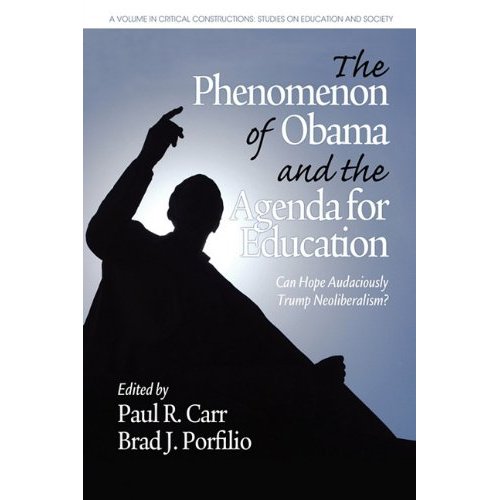The Journal of Critical Education Policy Studies
Special Issue: Spring 2012
An International Examination of Teacher Education: Exposing and Resisting the Neoliberal Agenda
Chief Editor: Professor Dave Hill, Chief/Managing Editor and Founding Editor, Professor Dave Hill, Professor Peter L. McLaren Editor, North America, Professor Pablo Gentili Editor, Latin America
Guest Editors: Dr. Brad Porfilio, Lewis University & Dr. Julie Gorlewski, SUNY at New Paltz
In recent decades, the transnational capitalist class has wielded power and influence to gain control over elements of social life that were once considered vital domains to fostering the social welfare of global citizens. Affected public domains include natural resources, health care, prisons, transportation, post-catastrophe restoration, and education. The chief linchpin in the elite’s corporatization over social affairs is its effective propaganda campaign to inculcate the global community to believe that neoliberal capitalism ameliorates rather than devastates humanity. According to political pundits, free-market academics, and corporate leaders, economic prosperity and improvements in the social world emanate from “unregulated or free markets, the withering away of the state as government’s role in regulating businesses and funding social services are either eliminated or privatized, and encouraging individuals to become self-interested entrepreneurs” (Hursh, 2011). Since neoliberalism is a term rarely uttered is most dominant (mainstream) media outlets, most citizens are not cognizant of how it is linked to many deleterious economic and social developments at today’s historical juncture, such as massive unemployment, the swelling of home foreclosures, homelessness, militarism, school closings, maldistribution of wealth, and environmental degradation (Hill, 2008; Hursh, 2011; McLaren, 2007; Ross & Gibson, 2007; Scipes, 2009). Equally important, many global citizens fail to recognize how the transitional elite have spawned a McCarthy-like witch hunt to eliminate academics, policies, and programs that have the potential to engage citizens in a critical examination of what is responsible for today’s increasingly stark social world – as well as what steps are necessary to radically transform it.
In this special issue of The Journal of Critical Education Policy Studies, we call on progressive scholars from across the globe to provide empirical research, conceptual analysis, and theoretical insights in relation to how corporate policies, practices, and imperatives are structuring life in schools of education. Since the impact of neoliberal capitalism on programs, policies, relationships, and pedagogies in schools of education is not uniform, as local histories and politics structure how macro-forces come to impact people in local contexts (Gruenwell (2003), the issue will be integral in understanding and confronting the social actors and constitute forces gutting the humanizing nature of education. Additionally, we call on critical scholars and pedagogues who have found emancipatory fissures amid corporatized schools of education to share policies, pedagogies, and cultural work that have the potency promote critical forms of education, democratic relationships, and peace, equity and social justice across the globe.
Manuscripts are due by December 1, 2011 and should be submitted as email attachments to porfilio16@aol.com and gorlewsj@newpaltz.edu.
Papers submitted for publication should be between 5,000 and 8000 words long. While we would hope that papers would be submitted in accordance with the Harvard Referencing Style, we do accept those written in any commonly accepted academic style, as long as the style is consistent throughout the paper.
Please direct all inquires about this special issue to the guest editors at Porfilio16@aol.com and gorlewsj@newpaltz.edu.



